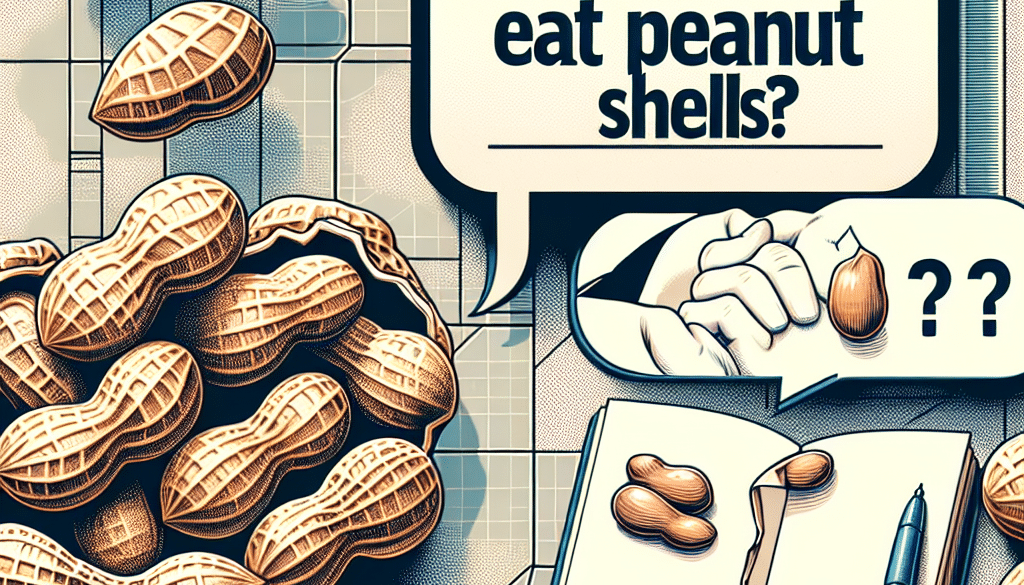Is It Bad to Eat Peanut Shells? Nutty Question Answered
-
Table of Contents
- Eating Peanut Shells: Nutritional Quirk or Health Risk?
- Understanding Peanut Shells
- Nutritional Profile of Peanut Shells
- Health Implications of Eating Peanut Shells
- Practical Considerations and Alternatives
- Case Studies and Statistics
- Conclusion: To Shell or Not to Shell?
- Discover ETprotein’s High-Quality Protein Products
Eating Peanut Shells: Nutritional Quirk or Health Risk?

Peanuts are a beloved snack enjoyed by millions around the world, often consumed at ball games, social gatherings, and as a quick source of protein. However, when it comes to peanut consumption, there’s a peculiar question that arises: Is it bad to eat peanut shells? This article delves into the heart of this nutty question, examining the potential health implications, nutritional aspects, and practical considerations of eating peanut shells.
Understanding Peanut Shells
Peanut shells, the fibrous outer covering of peanuts, are typically considered inedible and discarded. They are composed of cellulose, lignin, and other plant fibers that are tough and not easily broken down by the human digestive system. Before we can address whether eating peanut shells is advisable, let’s explore their composition and potential nutritional value.
Nutritional Profile of Peanut Shells
While not commonly consumed, peanut shells do have a nutritional profile worth noting:
- Fiber: Peanut shells are high in dietary fiber, which is essential for digestive health.
- Antioxidants: They contain compounds such as polyphenols, which have antioxidant properties.
- Minerals: Peanut shells have trace amounts of minerals like potassium and magnesium.
Despite these components, the question remains: Are these nutritional benefits accessible and beneficial to humans?
Health Implications of Eating Peanut Shells
While the idea of consuming peanut shells might seem harmless, there are several health concerns to consider:
- Digestive Issues: The human digestive system is not equipped to break down the high fiber content of peanut shells effectively. This can lead to gastrointestinal discomfort, blockages, and other digestive problems.
- Choking Hazard: The tough and fibrous nature of peanut shells can pose a choking risk, especially for children and the elderly.
- Contaminants: Peanut shells can harbor pesticides and other agricultural chemicals used during farming, which may be harmful if ingested.
- Aflatoxins: Peanuts and their shells can contain aflatoxins, toxic substances produced by certain molds that can be carcinogenic.
Given these potential risks, it’s important to weigh the pros and cons of eating peanut shells.
Practical Considerations and Alternatives
When it comes to practicality, eating peanut shells is not a common practice, and for good reason. The risks associated with consumption generally outweigh any potential nutritional benefits. Instead, consider these healthier alternatives:
- Eat the Peanuts: Peanuts themselves are a nutritious snack, rich in protein, healthy fats, and various vitamins and minerals.
- Compost Peanut Shells: If you’re looking for a sustainable option, peanut shells can be composted and used to enrich soil.
- Explore Other Fiber Sources: There are many safer and more digestible sources of fiber, such as fruits, vegetables, and whole grains.
By choosing these alternatives, you can enjoy the benefits of peanuts without the risks associated with eating their shells.
Case Studies and Statistics
While there is limited research on the direct effects of eating peanut shells, case studies and statistics on related dietary fibers and choking incidents provide insight into the potential risks. For example, excessive intake of indigestible fibers has been linked to intestinal blockages, and choking hazards are a well-documented concern in food safety.
It’s clear from the available data that caution should be exercised when considering the consumption of peanut shells.
Conclusion: To Shell or Not to Shell?
In conclusion, while peanut shells may contain some nutritional elements, the risks associated with eating them are significant. The potential for digestive issues, choking hazards, and exposure to contaminants make the practice of eating peanut shells inadvisable. Instead, focus on enjoying the nutritious peanut itself and consider environmentally friendly uses for the shells. By doing so, you can reap the benefits of peanuts without unnecessary health risks.
Discover ETprotein’s High-Quality Protein Products
If you’re looking for a nutritious protein source to complement your diet, consider ETprotein’s range of organic bulk vegan protein and plant proteins. Their products, including Organic rice protein, clear rice protein, pea protein, clear pea protein, pumpkin seed protein, sunflower seed protein, mung bean protein, and peanut protein, are non-GMO and allergen-free, making them a safe and healthy choice for various dietary needs.
ETprotein caters to a wide array of industries, providing high-quality protein solutions for nutraceuticals, pharmaceuticals, cosmeceuticals, veterinary products, and food and beverage applications. With a commitment to excellence and customer satisfaction, ETprotein is a trusted supplier for leading global brands and Fortune 500 companies.
For more information on how ETprotein can meet your protein needs, contact them at sales(at)ETprotein.com today.
About ETprotein:
ETprotein, a reputable protein Chinese factory manufacturer and supplier, is renowned for producing, stocking, exporting, and delivering the highest quality organic bulk vegan protein and plant proteins. They include Organic rice protein, clear rice protein, pea protein, clear pea protein, pumpkin seed protein, sunflower seed protein, mung bean protein, peanut protein etc. Their offerings, characterized by a neutral taste, non-GMO, allergen-free attributes, cater to a diverse range of industries. They serve nutraceutical, pharmaceutical, cosmeceutical, veterinary, as well as food and beverage finished product distributors, traders, and manufacturers across Europe, USA, Canada, Australia, Thailand, Japan, Korea, Brazil, and Chile, among others.
ETprotein specialization includes exporting and delivering tailor-made protein powder and finished nutritional supplements. Their extensive product range covers sectors like Food and Beverage, Sports Nutrition, Weight Management, Dietary Supplements, Health and Wellness Products, and Infant Formula, ensuring comprehensive solutions to meet all your protein needs.
As a trusted company by leading global food and beverage brands and Fortune 500 companies, ETprotein reinforces China’s reputation in the global arena. For more information or to sample their products, please contact them and email sales(at)ETprotein.com today.












